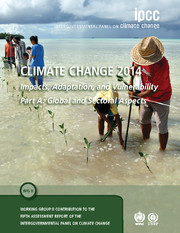 Climate Change 2014 – Impacts, Adaptation and Vulnerability: Part A: Global and Sectoral Aspects
Climate Change 2014 – Impacts, Adaptation and Vulnerability: Part A: Global and Sectoral Aspects Book contents
- Frontmatter
- Contents
- Foreword, Preface, and Dedication
- Summary for Policymakers
- Technical Summary
- Cross-Chapter Boxes
- Chapters 1-20
- Chapter 1 Point of Departure
- Chapter 2 Foundations for Decision Making
- Chapter 3 Freshwater Resources
- Chapter 4 Terrestrial and Inland Water Systems
- Chapter 5 Coastal Systems and Low-Lying Areas
- Chapter 6 Ocean Systems
- Chapter 7 Food Security and Food Production Systems
- Chapter 8 Urban Areas
- Chapter 9 Rural Areas
- Chapter 10 Key Economic Sectors and Services
- Chapter 11 Human Health: Impacts, Adaptation, and Co-Benefits
- Chapter 12 Human Security
- Chapter 13 Livelihoods and Poverty
- Chapter 14 Adaptation Needs and Options
- Chapter 15 Adaptation Planning and Implementation
- Chapter 16 Adaptation Opportunities, Constraints, and Limits
- Chapter 17 Economics of Adaptation
- Chapter 18 Detection and Attribution of Observed Impacts
- Chapter 19 Emergent Risks and Key Vulnerabilities
Chapter 13 - Livelihoods and Poverty
Published online by Cambridge University Press: 05 January 2015
- Frontmatter
- Contents
- Foreword, Preface, and Dedication
- Summary for Policymakers
- Technical Summary
- Cross-Chapter Boxes
- Chapters 1-20
- Chapter 1 Point of Departure
- Chapter 2 Foundations for Decision Making
- Chapter 3 Freshwater Resources
- Chapter 4 Terrestrial and Inland Water Systems
- Chapter 5 Coastal Systems and Low-Lying Areas
- Chapter 6 Ocean Systems
- Chapter 7 Food Security and Food Production Systems
- Chapter 8 Urban Areas
- Chapter 9 Rural Areas
- Chapter 10 Key Economic Sectors and Services
- Chapter 11 Human Health: Impacts, Adaptation, and Co-Benefits
- Chapter 12 Human Security
- Chapter 13 Livelihoods and Poverty
- Chapter 14 Adaptation Needs and Options
- Chapter 15 Adaptation Planning and Implementation
- Chapter 16 Adaptation Opportunities, Constraints, and Limits
- Chapter 17 Economics of Adaptation
- Chapter 18 Detection and Attribution of Observed Impacts
- Chapter 19 Emergent Risks and Key Vulnerabilities
Summary
13.1. Scope, Delineations, and Definitions: Livelihoods, Poverty, and Inequality
Understanding the impacts of climate change on livelihoods and poverty requires examining the complexities of poverty and the lives of poor and non-poor people, as well as the multifaceted and cross-scalar intersections of poverty and livelihoods with climate change. This chapter is devoted to exploring poverty in relation to climate change, a novelty in the IPCC. It uses a livelihood lens to assess the interactions between climate change and multiple dimensions of poverty. We use the term “the poor,” not to homogenize, but to describe people living in poverty, people facing multiple deprivations, and the socially and economically disadvantaged, as part of a conceptualization broader than income-based measures of poverty, acknowledging gradients of prosperity and poverty. This livelihood lens also reveals how inequalities perpetuate poverty to shape differential vulnerabilities and in turn the differentiated impacts of climate change on individuals and societies. The chapter first presents the concepts of livelihoods, poverty, and inequality, and their relationships to each other and to climate change. Second, it describes observed impacts of weather events and climate on livelihoods and rural and urban poor people as well as projected impacts up to 2100. We use “weather events and climate” as an umbrella term for climate change, climate variability, and extreme events, and also highlight subtle shifts in precipitation and localized weather events. Third, this chapter discusses impacts of climate change mitigation and adaptation responses on livelihoods and poverty. Finally, it outlines implications for poverty alleviation efforts and climate-resilient development pathways.
Livelihoods and Poverty is a new chapter in the AR5. Although the WGII AR4 contributions mentioned poverty, as one of several non-climatic factors contributing to vulnerability, as a serious obstacle to effective adaptation, and in the context of endemic poverty in Africa (Chapters 7, 8, 18, 20), no systematic assessment was undertaken.
- Type
- Chapter
- Information
- Climate Change 2014 – Impacts, Adaptation and Vulnerability: Part A: Global and Sectoral AspectsWorking Group II Contribution to the IPCC Fifth Assessment Report, pp. 793 - 832Publisher: Cambridge University PressPrint publication year: 2014
- 5
- Cited by


